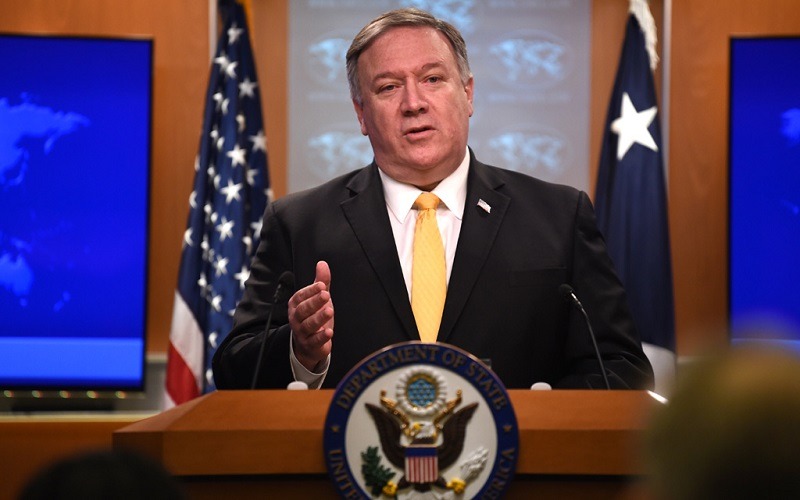With the start of the presidential election campaign in 2016, Donald Trump chanted slogans and programs that were most pleasing to the Zionist regime. This prompted the AIPAC, the Zionist lobby in the United States, to promote and support Trump. On the other hand, Kushner, Trump’s son-in-law, was sitting next to him, telling him everything Netanyahu wanted. All this comes at a time when Israeli officials during the presidency of Barack Obama were not able to implement some of their intended policies, especially in dealing with Iran; but with Trump winning the US presidential race, we saw him recognize Jerusalem as the capital of the Zionist regime, which was against the Security Council resolutions. Also, contrary to the provisions of the Oslo Peace Pact, in which the Zionist regime is committed to non-settlement, Trump has in fact strengthened the position of the Zionist regime by recognizing some of the Israeli occupation.
This trend became more apparent after Mike Pompeo came to the State Department. Pompeo, backed by Kouchner and the Zionist lobby, has become a major supporter of the Zionist regime’s demands in the US foreign policy apparatus, including the issue of Iranophobia and confrontation with Iran. As he is practically advancing belligerent policies against Iran with the behind-the-scene support of the Zionist regime. On the other hand, the Zionist regime, which seeks to attract the Americans in order to unite against Iran, is well aware that it cannot achieve its goals alone in this matter. Therefore, behind the scene, they have coordinated with Pompeo to narrow the circle of pressure on Iran and finally plan the war.
Pompeo’s Failure to Push Trump into Swamp of Military Confrontation with Iran
The coordination between the Zionist regime and Pompeo to intensify anti-Iranian actions increased when Trump, who had initially aligned himself with Israeli Prime Minister Benjamin Netanyahu to pave the way for a war with Iran, gradually realized that he should not enter the game. In fact, Trump, who is only four months away from the US presidential election in November, speculates that it is not possible to set up the puzzle of enmity with Iran in the short term to win the citizens’ vote and turn himself into a hero or would not produce his desired outcome. That is why we see today that Pompeo, along with Netanyahu, has taken over the implementation of belligerent policies in the White House.
In fact, the US Secretary of State, a CIA figure, has been trying to persuade Trump to get deeply involved in the issue of extremism in security issues, including Iran, but he has not succeeded. Therefore, in recent months, he has shown that while inciting Trump, he is preparing his political games against Tehran, which, of course, originate from the policy of the Zionist regime.
In fact, in recent years, the Zionist regime has felt threatened by Iran’s movements in Syria, Iraq and Lebanon, and has repeatedly heard the slogan from Iran that “the Zionist regime will be removed from the world map.” On the other hand, this regime, which failed to pursue its policies towards Iran during the presidency of Barack Obama saw a window of hope for itself with the coming to power of Trump, which, of course, continued to fail, as Trump gradually came to terms with the facts Iran has realized, but Pompeo, who is looking for the smallest loophole to pursue policies against Iran, is still working with Netanyahu to advance that goal.
Despite the grounds that Pompeo is constantly finding to implement his policies, in practice he has failed to make any accomplishment. For example, the basis of US foreign policy, which is the maximum pressure on Iran, has not been welcomed by EU member states, and even with the withdrawal of Trump from the Joint Comprehensive Plan of Action he and his colleagues could not change the European side’s view of Iran. Even during the “trigger mechanism” plan, Pompeo grabbed every thread, including the International Atomic Energy Agency, to enforce it, but the Europeans said that despite the US withdrawal from the JCPLOA this agreement with Iran must be maintained.
All this occurs while Trump and his allies thought that by leaving the JCPLOA they could put the Europeans in their line against Iran, but at the last meeting of the Security Council, which was about three weeks ago, they still failed to make any progress. The chain of failure of the US foreign policy group under Trump has gone so far that many analysts and experts now believe that, contrary to the approach of American politicians, Washington’s interests have been further jeopardized by the rise of militant figures such as Pompeo, while they wanted to take a course different from the previous politicians of this country but so far they have gained nothing but defeat.










0 Comments